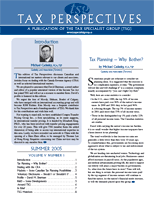
PDF Format
 Issue Contents Issue Contents
 All Issues All Issues
Summer 2005
Volume 5, Number 1
The information in Tax Perspectives is prepared for general interest only. Every effort has been made to ensure that the contents are accurate. However, professional advice should always be obtained before acting and TSG member firms cannot assume any liability for persons who act on the basis of information contained herein without professional advice.
Dealing With the Canada Revenue Agency ("CRA")
By Hugh Woolley, CA
Lewis and Company (Vancouver)
One's success in dealing with a CRA audit can depend on the approach taken. Several years ago I read Stevie Cameron's book, "Blue Trust," about the life of prominent Montreal tax lawyer, Bruce Verchere. The book fascinated me so much that I decided to read the articles that Mr. Verchere had written for the Canadian Tax Foundation. At the 1981 Annual Conference, Mr. Verchere presented a paper on Income Tax Appeals: Practice and Procedures. Twenty-four years later this article is still interesting reading and includes such passages as: "...the method of ensuring compliance with the Income Tax Act gives rise to an adversary system..." "...the tax litigation process starts as soon as the assessors commence their audit..." "...Revenue Canada does not undertake an audit or investigation in the expectation of coming up empty-handed." Between 1990 and 1992, I worked under the Interchange Program at the CRA's Rulings Directorate. I quickly learned that the CRA is not a monolithic entity that speaks with a single voice, but is rather a collection of very individualistic personalities who frequently differ in their opinions and approaches. For this reason, it is virtually impossible to describe the single best approach in dealing with the CRA. Compounding this, not all clients have the same risk profile, with some being either more aggressive with their tax filings or more disorganized with their collection and retention of records. In my practice, while assisting accounting firms in managing tax audits and resolving disputes, I have seen that some have greater success with the CRA than others. Generally, I have found that those who manage the process from start to finish consistently achieve better results. I suggest that there are two simple explanations. Firstly, by dealing with the auditor in a respectful fashion, at an early stage, one develops a rapport with him or her, which makes it more difficult for the auditor to issue a punitive or unreasonable assessment. Secondly, by dealing with issues as they arise, one can "nip problems in the bud." Delays in addressing issues or miscommunication frequently cause positions to become entrenched, which makes it much more difficult for the position to be reversed later. So how do you manage the process to best advantage? It makes sense to review possible areas of tax exposure before the audit commences. This allows for more control over the audit. For an operating business, begin by giving the auditor a tour of the company's facilities and show the non-financial operations of the business. Let the auditor see employees working on the shop floor. This not only brings the financial statements to life, but also enables the auditor to see the human side of a company's operations. I like to have the auditor meet with the company's owner, the head of accounting and the company's tax advisor. This allows the client to provide a history of the business and, hopefully, present the company in a favourable light, often by finding some common ground with the auditor. Such a meeting will satisfy the auditor's requirement to interview the owner, before having an opportunity to formulate any detailed questions. Having the tax advisor present during the meeting permits the interpretation of questions directed to the client and clarification of answers provided by the client. This avoids issues being blown out of proportion. Often, an unprepared client will reply to a question without understanding the tax significance of the question or the answer given. Give the auditor a private room to review the accounting records. I do not subscribe to the theory that, if you put the auditor in a cold closet, he or she will want to leave as quickly as possible. Usually, I ask the auditor to compile a list of questions to give to the client at the end of each day. Allowing the auditor free access to all company employees will cause two problems. Firstly, it makes the auditor's job too easy, as you end up doing all the work, and, secondly, an answer may be misconstrued by the auditor. At the end of each day, the client should contact the tax advisor and prepare suitable answers to written queries. No approach will always work and there is nothing you can do to convert the most hard-line auditor. However, it has been my experience that attempting to create a relationship with the auditor based on mutual respect and trust is the strategy most likely to yield the best overall result.
| 






